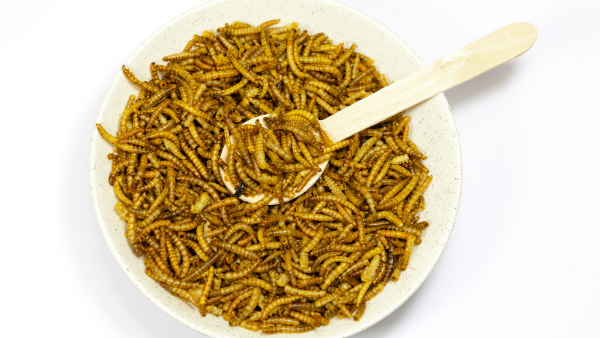Author
The European Food Safety Authority (EFSA) has concluded that dried yellow mealworm is safe for human consumption.
EFSA’s eagerly anticipated scientific opinion was published in January 2021 (the EFSA Opinion), almost three years after the applicant (SAS EAP Group – Micronutris) first submitted their Novel Food application in February 2018. This is EFSA’s first insect approval under the new EU Novel Foods Regulation (the Novel Foods Regulation), which came into force in January 2018. The approval is based upon the levels and uses proposed by Micronutris.
According to the International Platform of Insects for Food and Feed (IPIFF) – the European umbrella organisation representing stakeholders active in the production of insects for food and feed, this represents an “important milestone towards the wider EU commercialisation of edible insects”.
Novel Food Regulation
Although edible insects are already consumed by about 2 billion people worldwide (according to the United Nations’ Food and Agriculture Organisation), cultural, psychological and legal barriers have prevented insects from being readily accepted in western diets. This is beginning to change as we learn more about their sustainable and nutritional qualities.
Edible insects are regulated under the Novel Foods Regulation, which updated the law on novel foods in 2018 and explicitly incorporated ‘whole insects and their parts’. The Novel Foods Regulation captures food or ingredients which were not used for human consumption to a significant degree within the European Union before 15 May 1997. Under the Novel Foods Regulation, insects and their derived ingredients can be lawfully placed on the EU market, but require pre-market authorisation. In order to be granted market authorisation, an application must be made to the European Commission, the product must go through a safety evaluation by EFSA and receive a favourable vote from the EU Member States.
Once a food is included in the EU authorised novel foods list, others can sell that same food in accordance with the conditions set out in the list. The exception is if the application is subject to data protection measures which preclude other producers from relying on the authorisation. Although the Micronutris application (and therefore approval) is data protected, such approval still paves the way for other application approvals. As noted by IPIFF, the approval constitutes “a major step forward for other European Producers of yellow mealworm and other edible insect species for which a novel food application has been submitted”.
Currently, there are over twenty pending applications submitted for the authorisation of insects as a novel food. Several species are covered, including Acheta domesticus (house cricket), Alphitobiusdiaperinus (lesser mealworm), Gryllodes sigillatus (banded crickets), Hermetia illucens (black soldier fly), Locusta migratoria (migratory locust), Tenebrio molitor (yellow mealworm) and Apis melliferamale pupae (honeybee drone brood). The applicants are generally insect primary producers / insect breeders who sell insects as raw material to a subsequent processor and/or directly to consumers through an intermediary or distributor.
The importance of labelling
In the EFSA Opinion, EFSA highlighted that allergic reactions from the product are likely to occur for certain categories of population (e.g. those allergic to crustaceans). However, IPIFF has commented that “these risks are indeed well-known to insect producers” and that “several insect producing companies have developed in-depth evidence to help in mitigating such risks”. It is now for the industry and regulators to develop labelling and marketing measures to ensure appropriate information is provided to consumers.
Next steps – European Commission approval
Now that EFSA has concluded that dried yellow mealworm (as outlined by Micronutris in their application) is safe, the EFSA Opinion will be sent to the European Commission to propose the EU authorisation of the novel food and the formulations covered by the EFSA Opinion on the EU market. Such an authorisation is expected by mid-2021.
Brexit – can UK insect producers rely on the EFSA Opinion?
The Novel Foods Regulation falls within the body of UK ‘retained law’ following the UK’s full withdrawal from the European Union on 31 December 2020. However, the manner in which the Novel Foods Regulation is enforced in each member country is dealt with in member country-specific legislation. In the UK, this is currently via the Novel Foods (England) Regulations 2018.
For novel foods already authorised by the European Commission before 1 January 2021 (with the necessary legislation already in place), the retained EU law position means that authorisation is still valid in the UK after 1 January 2021. However, the Food Standards Agency (FSA) has now made it clear that, if a novel food application was made to the European Commission before 1 January 2021 and the assessment process for the application has not been completed, applicants will need to submit their application to the FSA, using the FSA’s own application service.
Unfortunately, although EFSA has now concluded that dried yellow mealworm is safe, the European Commission has not yet authorised it as a novel food and no legal approval was in place prior to 1 January 2021. As such, for the authorisation to be valid in the UK, it appears the FSA requires separate applications to authorise insects not yet formally adopted by the European Commission (including dried yellow mealworm). The FSA states that “in most cases, applications will take at least a year” – we hope that such time-frame can be minimised where duplicate novel food applications, or applications for duplicate products processed in the same way, are already approved by EFSA.
The future
Insects are emerging as a suitable, nutritional and sustainable source of protein and EFSA’s first insect approval under the Novel Food Regulation is a significant step in the development of this industry. It is now important for the UK to follow suit and keep up with, or even advance ahead of, EU progress around approving insect species as novel foods, to avoid delaying and suffocating future innovation.
We will be monitoring the EU novel food approvals and UK counterpart position (via the FSA) carefully and will provide further updates as they become available. This is also likely to be a topical discussion point at the virtual ‘Insects as Food and Feed’ conference in April – collaborative event between ADAS, Michelmores, Multibox and the Royal Entomological Society’s Food & Feed Special Interest Group. Further conference details and registration information can be found here.
Article contributors: Rachel O’Connor.
Print article

